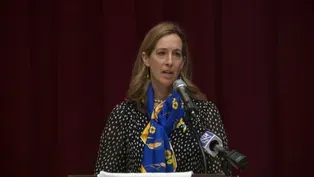NJ Spotlight News
Rutgers study offers potential Alzheimer's breakthrough
Clip: 2/28/2024 | 4m 10sVideo has Closed Captions
Interview: Researcher Max Tischfield, Rutgers University
A group of undergraduate students at Rutgers University is behind a groundbreaking discovery in the fight against Alzheimer’s disease. The team found that an experimental drug may help the brain get rid of toxins that cause Alzheimer’s and other forms of dementia.
Problems with Closed Captions? Closed Captioning Feedback
Problems with Closed Captions? Closed Captioning Feedback
NJ Spotlight News is a local public television program presented by THIRTEEN PBS
NJ Spotlight News
Rutgers study offers potential Alzheimer's breakthrough
Clip: 2/28/2024 | 4m 10sVideo has Closed Captions
A group of undergraduate students at Rutgers University is behind a groundbreaking discovery in the fight against Alzheimer’s disease. The team found that an experimental drug may help the brain get rid of toxins that cause Alzheimer’s and other forms of dementia.
Problems with Closed Captions? Closed Captioning Feedback
How to Watch NJ Spotlight News
NJ Spotlight News is available to stream on pbs.org and the free PBS App, available on iPhone, Apple TV, Android TV, Android smartphones, Amazon Fire TV, Amazon Fire Tablet, Roku, Samsung Smart TV, and Vizio.
Providing Support for PBS.org
Learn Moreabout PBS online sponsorshipA groundbreaking discovery in the fight against Alzheimer's disease made it right here in New Jersey by a group of undergrads at Rutgers University.
The team found an experimental drug may help the brain get rid of toxins that cause Alzheimer's and other forms of dementia.
I recently spoke with Max Tischfield, a resident researcher at Rutgers, about what this discovery means for treatment.
Max Tischfield, great to talk to you.
On paper, this definitely looks like a pretty significant breakthrough.
What exactly did you and your team find?
Yeah.
So we have been researching and studying the brain's waste clearance system.
And this is a system that allows the brain to clear metabolites and waste and including neurotoxins.
And these neurotoxins consist of amyloid beta and tao.
And these are culprits in degenerative diseases like Alzheimer's.
And what we have found is by studying a mouse model for a craniofacial disorder or cranial stiffness ptosis and this is a disorder that affects how the skull grows.
We serendipitously discovered that there were changes to how these systems develop and how they're maintained over the lifespan.
And that's very important because recent data has shown that as we age, our ability to clear waste from the brain declines.
So there's a lot of interest in understanding how can we facilitate and rejuvenate these brain waste clearance systems.
And that's part of what our team was able to find by using this small molecule drug called Yota one.
And how does Yota one target that brain waste, as you call it, or the amyloid plaque, which we've really come to know to be synonymous with conditions like dementia?
Yeah, well, I think I think that question has potentially two answers, one of which, as we showed, it, facilitates the ability of fluid to actually perfused into your brain and clear the waste out.
And once the waste is cleared out, it's drained through something called lymphatic vessels or meningeal lymphatic vessels.
And these are vessels that basically reside around the brain, beneath your skull.
And these were just discovered ten years ago.
And for that reason, there's a lot of interest in these vessels.
Yeah.
I was just about to ask you why.
We're just looking at those lymphatic vessels and thinking about treatments like cranial sacral therapy, which does a similar process of getting more of that cerebral spinal fluid into the brain.
Why is science just now getting to look at these vessels?
Yeah, well, interestingly enough, these vessels were first described in the late 1700s.
But as scientists like to do, they tend to argue sometimes and challenge each other's observations.
And they were challenged.
And because of that, for hundreds of years, we lost sight of these vessels.
And only within the last ten years or so were they rediscovered by two different groups.
And now that we've discovered them, we can now figure out how we can manipulate them to actually help clear waste.
And that's what our drugs show.
These tests, these trials are being done on mice, Max.
How soon might we see human trials?
Yeah, well, as anything with science, the first breakthroughs usually come through in an animal model.
And I should say that the drug has not been tested yet in humans.
But I think, given the results that we've recently reported and that of others, there may be a push very soon to actually ask how might this drug affect, for example, fluid dynamics in a human?
Of course.
Would it be safe?
Would it have nontoxic properties and in mice, we know that, in fact, it does.
But I think that's one of the really interesting and important aspects to consider.
It could be very safe for human usage.
Max Tischfield is an assistant professor of cell biology and neuroscience with Rutgers University.
Max, thank you so much.
Thank you for having me.
It's a pleasure to be here.
Cheers and jeers for Murphy’s NJ Transit tax plan
Video has Closed Captions
Clip: 2/28/2024 | 5m 22s | Transit advocates, business interests differ on new fee for big corporations (5m 22s)
Critics protest turnpike expansion plan at Newark open house
Video has Closed Captions
Clip: 2/28/2024 | 4m 23s | Project involving a stretch between Newark and Jersey City has prompted pollution fears (4m 23s)
Feds send $33M for a trio of Superfund cleanups in NJ
Video has Closed Captions
Clip: 2/28/2024 | 1m 18s | The sites are the Matlack, Inc., Raritan Bay Slag, and Roebling Steel Company (1m 18s)
Murphy’s big budget proposal — increase school funding
Video has Closed Captions
Clip: 2/28/2024 | 4m 44s | Gov. Phil Murphy proposes historic increase in school funding (4m 44s)
Sherrill reiterates plea for US military aid for Ukraine
Video has Closed Captions
Clip: 2/28/2024 | 4m 12s | NJ congresswoman shared her experience and worry for Ukrainian forces (4m 12s)
Providing Support for PBS.org
Learn Moreabout PBS online sponsorshipSupport for PBS provided by:
NJ Spotlight News is a local public television program presented by THIRTEEN PBS
















